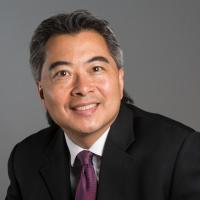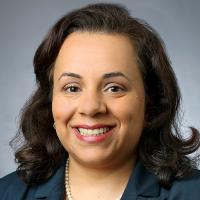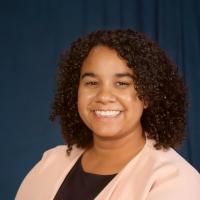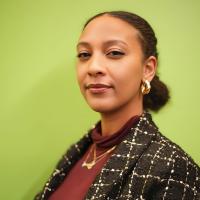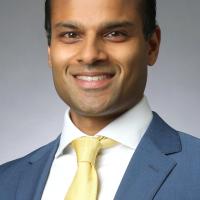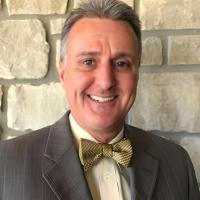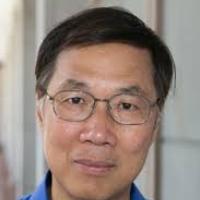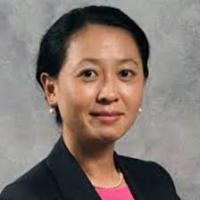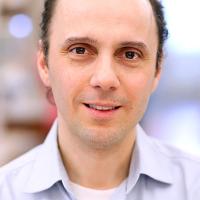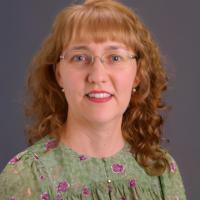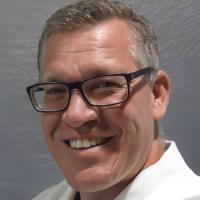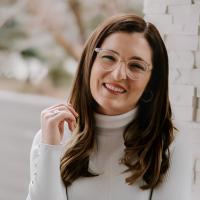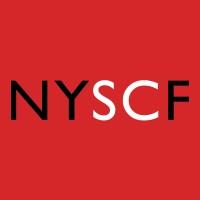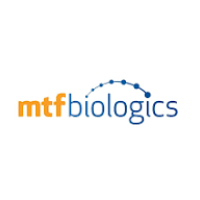NOVAJoint Team
Meet the members of the NOVAJoint Research Project
The NOVAJoint research team is developing a regenerative knee implant to restore full joint function to patients severely impacted by osteoarthritis (OA).
This research is funded by the Advanced Research Projects Agency for Health (ARPA-H) program on Novel Innovations for Tissue Regeneration in Osteoarthritis (NITRO).
LEADERSHIP TEAM
Primary Investigators
Clark Hung, PhD
- Professor of Biomedical Engineering, Professor of Orthopedic Sciences (In Orthopedic Surgery)
Clark Hung, PhD, pursues multidisciplinary research using state-of-the-art biological and engineering tools to perform studies to investigate physical effects (e.g., cell deformation, fluid flow effects, osmotic pressure) on cells and tissues and the incorporation of these forces in strategies to develop functional cartilage substitutes. An understanding of the effects of physical forces on cells is important in the development of effective tissue replacements that mimic or restore normal tissue structure-function in orthopaedic and other load-bearing tissues of the body. Such studies may lead to strategies aimed at alleviating the most prevalent and chronic problems afflicting the musculoskeletal system such as arthritis and problems related to sports and occupational injuries.

Nadeen Chahine, PhD
- Associate Professor of Biomedical Engineering (in Orthopaedic Surgery)
Dr. Chahine holds a bachelor's degree in biomedical engineering from Boston University. She completed her graduate studies at Columbia University, having earned a Master’ of Science (2002), Master of Philosophy (2006) and Doctor of Philosophy (2006) in Biomedical Engineering. Dr. Chahine completed her post-doctoral training as an Ernest Lawrence Fellow at Lawrence Livermore National Laboratory (Department of Energy), where she trained in micro and nanotechnology. In 2009, she started a faculty position at the Feinstein Institute for Medical Research in New York. Dr. Chahine joined the faculty at Columbia University in 2017 as an Associate Professor in Orthopedic Surgery and Biomedical Engineering.

Project Manager
Robyn Ridley, PhD
Dr. Ridley has extensive interdisciplinary experience in research, teaching, design, and leadership. She graduated from Columbia University School of Engineering and Applied Science with a BS in materials science. She then earned her MS and PhD in materials science and engineering at University of California, San Diego (UCSD) while conducting analytical chemistry research on colloidal systems for nanoparticle synthesis. Following her time at UCSD, she joined the faculty at Wesleyan University where she created and taught project-based courses in mechanical design and engineering and helped found the College of Design and Engineering Studies. Dr. Ridley joined Columbia University as the Project Manager for NOVAJoint in 2024.

Engagement Officer
___________________________________________________________________________
Research Leads
Treena Arinzeh, PhD
- Professor of Biomedical Research
Treena Livingston Arinzeh’s research focuses on the development of functional biomaterials and tissue engineering strategies for the repair of damaged or diseased tissues. Tissue engineering approaches include the use of stem cells and other cell types in combination with biomaterial scaffolds as a therapeutic strategy and for use as in vitro models to understand the development of normal and diseased tissues. Her most cited work to date has been in the use of allogeneic mesenchymal stem cells (MSCs) to induce bone formation without the use of immunosuppressive therapy, demonstrating the potential use of MSCs as an off-the-shelf therapy. Recent accomplishments include the development of piezoelectric materials, which are smart materials, processed into fiber structures that mimic both structure and function of ECM matrices. Piezoelectric materials can provide electrical stimulation without the use of external electrodes. Arinzeh has demonstrated feasibility of these materials for bone, cartilage and neural tissue engineering applications. She also develops biomimetic, naturally-derived materials, such as glycosaminoglycan-mimetics, that provide bioactivity and promote tissue repair through growth factor interaction and other mechanisms.

Gerard Ateshian, PhD
- Andrew Walz Professor of Mechanical Engineering and Professor of Biomedical Engineering
Gerard Ateshian performs research in the field of soft tissue mechanics, with an emphasis on cartilage mechanics, lubrication, and tissue engineering, and the formulation of growth theories for biological tissues. A major component of his research focuses on understanding and treating osteoarthritis. In collaboration with Prof. Clark T. Hung at Columbia, he has translated his findings on cartilage mechanics to the field of functional cartilage tissue engineering, with the aim of developing biological tissue implants for osteoarthritic joints. Together with Dr. Jeffrey A. Weiss at the University of Utah, he has developed open-source computational tools that facilitate the modeling of tissue mechanics, transport, and growth processes (febio.org). With Dr. Melvin P. Rosenwasser at the Columbia University Medical Center, he has developed a novel clinical treatment modality for thumb osteoarthritis using bent osteochondral allografts.

Alice Huang, PhD
- Associate Professor of Bioengineering (in Orthopedic Surgery)
Dr. Alice Huang graduated from Barnard College and the School of Engineering and Applied Science at Columbia University with a BA in Asian/Middle Eastern Studies and a BS in Biomedical Engineering. She then completed her PhD in Bioengineering at the University of Pennsylvania. After completing her graduate studies, Dr. Huang conducted postdoctoral research in Developmental Biology at Shriners Hospital for Children, where she investigated mechanisms of musculoskeletal development and integration during embryogenesis. In 2014, Dr. Huang joined the faculty at Mount Sinai as an Assistant Professor in the Department of Orthopaedics, with a secondary appointment in Developmental and Regenerative Biology. Dr. Huang joined Columbia University in 2021 as an Associate Professor.

Chang Hun Lee, PhD
- Associate Professor of Craniofacial Engineering (in Dental Medicine)
Dr. Lee received his BS in Biomedical Engineering from Inje University (South Korea) in 2002. He completed his Ph.D. in Biomedical Engineering from Columbia University in 2010 and received postdoctoral training until 2014 at Center for Craniofacial Regeneration in College of Dental Medicine. Dr. Lee is currently an Assistant Professor of Craniofacial Engineering (in Dental Medicine) and he also serves as the Director of Research at the College of Dental Medicine.

Roshan P. Shah, MD, JD
- Russel A. Hibbs Associate Professor of Orthopedics (in Orthopedic Surgery), Assistant Attending
Roshan P. Shah, MD, JD, specializes in hip and knee reconstruction using minimally invasive techniques for less pain and faster recovery times. He believes there are many valuable pain-relieving treatments that do not involve surgery. When an operation is needed, he embraces careful surgical techniques with attention to the biological, anatomical, and mechanical restoration that is critical for a pain-free return of function.

James Cook, DVM, PhD, OTSC
- University of Missouri PI
- Director of Thompson Laboratory for Regenerative Orthopaedics, Director of Operations & Research, Mizzou BioJoint Center
Director of Thompson Laboratory for Regenerative Orthopaedics
Director of Operations & Research, Mizzou BioJoint Center
William C. and Kathryn E. Allen Distinguished Chair in Orthopaedic Surgery
Division Chief of Orthopaedic ResearchSince joining the University of Missouri faculty in 1999, Dr, Cook has taken the field of orthopaedics by storm. He helped identify a test to detect arthritis before symptoms begin and discovered how to more than double the shelf life of donor cartilage tissue. He also invented a minimally invasive procedure to stabilize knee joints in dogs without cutting through the bone.
Now, Cook is pioneering a biological knee replacement: a living joint formed from cartilage cells. Unlike an artificial knee, which starts to deteriorate immediately, the biologic knee would continue to grow and adapt within the patient’s body. “It’s possible that the new knee will be better in 10 years than it was when we first implanted it,” he says. Cook has performed biologic knee replacement surgery on horses and dogs, and he hopes one day it can be used in people with arthritis, like his grandpa.

Columbia Co-Investigators (Co-Is)
Mildred Embree, DMD
- Dr. Edwin S. Robinson Assistant Professor of Dental Medicine (Orthodontics)
Dr. Embree conducts cutting edge research in both an academic and clinical setting with the goal of translating basic science into clinical practice. Dr. Embree's laboratory focuses on TMJ biology and disease, stem cells and stem cell-based cartilage and bone regeneration. Dr. Embree and her team use a combination of stem cell/molecular biology methods and clinical questions in shaping the direction of scientific projects. Overall, Dr. Embree's research endeavors are geared toward improving the current treatment modalities for patients with TMJ and musculoskeletal diseases.

Elan L. Goldwaser, DO
- Assistant Professor of Sports Medicine (in the Center for Family and Community Medicine, in Medicine and Orthopedic Surgery), Assistant Attending
Elan L. Goldwaser, DO, is a sports medicine physician specializing in the non-operative management of complex musculoskeletal conditions affecting athletic participation, including chronic and acute injuries affecting the bones, joints, and muscles of pediatric and adult patients. Dr. Goldwaser’s training as an osteopathic physician provides additional treatment approaches to promote healing through a variety of options and tailored patient care. As an experienced team physician to high school, collegiate, and professional athletes, Dr. Goldwaser is accustomed to treating injuries sustained in the acute setting of sporting events including: management of concussions, tendon injuries, and leg somatic dysfunctions (including Achilles/Patellar tendonitis).

X. Edward Guo, PhD
- Adjunct Associate Professor of Business
X. Edward Guo, Director of Columbia’s Bone Bioengineering Laboratory, is trying to figure out how to prevent and treat osteoporosis from both engineering analysis and biological perspectives. To do so, he and his team are analyzing high-resolution 3-D images of bone from both laboratory samples and non-invasive patients’ images to figure out how to better predict fracture risk in patients and monitor efficacy of anti-osteoporosis treatment. With several multi-million-dollar grants supported by the National Institutes of Health (NIH) and working with endocrinologists Drs. Elizabeth Shane and John Bilezikian at Columbia University’s College of Physicians and Surgeons, and Dr. Felix Wehrli at the University of Pennsylvania, they have developed novel imaging analysis and modeling techniques to identify microstructural deteriorations in bone and have translated these technologies in clinical assessments of osteoporosis. Guo and his team also plan to use their knowledge to better understand osteoporosis and bone loss experienced by astronauts in outer space.

Kam W. Leong, PhD
- Samuel Y. Sheng Professor Of Biomedical Engineering (In Systems Biology)
Dr. Leong’s research focuses on the development of innovative biomaterials for two major therapeutic applications: drug delivery and regenerative medicine. He uses polymeric biomaterials to deliver chemotherapeutics, DNA-based therapeutics, and cells for cancer therapy, gene therapy, immunotherapy, and cell therapy. He also uses tissue engineering principles and stem cell engineering to construct human tissue-on-a-chip for disease modeling and high throughput drug screening.

Helen H. Lu, PhD
- Percy K. and Vida L.W. Hudson Professor of Biomedical Engineering and Professor of Dental and Craniofacial Engineering (in Dental Medicine); Senior Vice Dean of Faculty Affairs and Advancement
Helen H. Lu, PhD
Percy K. And Vida L.W. Hudson Professor Of Biomedical Engineering
Senior Vice Dean Of Faculty Affairs and AdvancementHelen H. Lu’s research focuses on tissue interfaces, particularly how to reestablish the body’s natural synchrony between tissues, a hallmark of the musculoskeletal system and the nexus of human mobility. The body of fundamental knowledge she has uncovered regarding interfaces and interface scaffold design has provided blueprints for building organs-on-a-chip as well as total limb regeneration. Her group is also active in the design of composite biomaterials for orthopaedic and dental applications, with a particular interest in the mechanism of cell-matrix interactions and its application to multi-functional scaffold design.
Lu is a leader in regenerative materials research and innovation for health and beyond health. From sustainable fabrication of biomedical devices by establishing eco-manufacturing with benign chemicals for expediting FDA-approval, to harnessing the ability of cells to make materials, the Lu group and collaborators have developed a biomaterial platform informed by a green chemistry framework, a breakthrough that shows industries how to explore sustainable manufacturing to engineer regenerative materials.

José McFaline-Figueroa, PhD
- Assistant Professor of Biomedical Engineering
José L. McFaline-Figueroa’s research focuses on defining the molecular changes induced in cancer cells after exposure to anti-cancer therapy, how those changes alter response to treatment and how they differ as a function of the genetic background of individual cancer cells.
Dr. McFaline-Figueroa received his bachelor’s degree in Chemistry from the University of Puerto Rico at Mayagüez (2006) and his PhD in Biology from the Massachusetts Institute of Technology (2014). He was a postdoctoral fellow at the University of Washington (2015-2020).
Samuel K. Sia, PhD
- Professor Of Biomedical Engineering, Faculty Director of Seas Entrepreneurship, Vice Provost for the Fourth Purpose and Strategic Impact
Samuel Sia develops technologies for point-of-care blood tests, wearable sensors, and implantable devices, both in an academic and industry setting. He co-developed a point-of-care blood test for prostate cancer which has garnered FDA approval, and is co-founder of Rover Diagnostics which is developing rapid and low-cost detection of DNA and RNA.

Joanna Smeeton, PhD
- H.K. Corning Assistant Professor Rehabilitation and Regenerative Medicine Research (in Rehabilitation and Regenerative Medicine) (in Genetics and Development)
Joanna Smeeton, PhD, is a member of the Columbia Stem Cell Initiative and an Assistant Professor in the Departments of Rehabilitation & Regenerative Medicine and Genetics & Development at Columbia University. Joanna obtained her BSc from McGill University and her PhD training from the University of Toronto at the Sick Kids Research Institute. As a postdoctoral fellow at the University of Southern California she developed genetic and surgical injury models for osteoarthritis and joint tissue regeneration in zebrafish. Joanna is a recipient of the NIH Pathway to Independence Award and the NIH Director’s New Innovator Award. The Smeeton lab aims to uncover the cellular and molecular mechanisms driving the development and regeneration of synovial joint tissues, including ligaments and articular cartilage.

Stavros Thomopoulos, PhD
- Robert E. Carroll and Jane Chace Carroll Laboratories Professor of Biomechanics (in Orthopaedic Surgery and Biomedical Engineering)
Dr. Thomopoulos holds a bachelor's degree in mechanical engineering from Columbia University, and Masters of Science degrees in both mechanical engineering and biomedical engineering from the University of Michigan. He completed his doctoral studies in biomedical engineering in 2001 through the University of Michigan. After a two-year postdoctoral fellowship at Columbia University in Biomedical Engineering, he started a faculty position at Washington University in 2003. Dr. Thomopoulos joined Columbia University in 2015 as a full professor and the director of the Carroll Laboratories.

University of Missouri Co-Investigators (Co-Is)
Chantelle C. Bozynski, DVM
- Head, Pathology and Translational Research Assistant Research Professor
Through the Thompson Laboratory for Regenerative Orthopaedics, Dr. Bozynski's team's research focuses on orthopedic disorders of diarthrodial joints. She is the principal investigator on a study to develop a reliable panel of protein biomarkers in serum and urine with high discriminatory capability for early diagnosis of hip dysplasia in skeletally immature dogs. Based on her extensive experience in histopathology of synovium, meniscus, tendons, ligaments, fat pad, intervertebral discs, articular cartilage, and bone, she is responsible for examination of all study tissues. Her main roles are to (i) quantify and characterize microarchitectural changes seen in joint tissues of the limbs and intervertebral disc for in vivo, ex vivo and in vitro studies, (ii) develop and validate biomarkers of osteoarthritis in synovial fluid, serum, and urine, and (iii) validate canine models of osteoarthritis.

Lisa A. Royse, PhD
- Assistant Research Professor
Dr. Royse leads patient engagement in research and qualitative research for the Department of Orthopaedic Surgery. She is dedicated to building patient-researcher partnerships that support and enable improved health outcomes and health care experiences. She is the Project Lead of a Patient-Centered Outcomes Research Institute (PCORI) Eugene Washington Engagement Award that supports development of the Patient AdvisoR Team iN Orthopaedic ReSearch (PARTNORS) program. PARTNORS focuses on building infrastructure for more meaningful patient engagement in research by involving and collaborating with patient partners to identify research areas important to them and co-create patient-centered outcomes research. Her experience also includes providing qualitative methods expertise for two Agency for Healthcare Research and Quality (AHRQ)-funded pilot projects through MU’s Center for Patient-Centered Outcomes Research aimed to design better pain assessment measures and pain education in health care. Before joining the Department of Orthopaedic Surgery, Dr. Royse led programmatic evaluation and technological innovations for MU School of Medicine’s Office of Medical Education.

Kylee J. Rucinski, PhD, MHA
- Assistant Research Professor, Orthopedic Surgery
Kylee J. Rucinski, PhD, MHA, leads registry-based illness-specific research for the Department of Orthopaedic Surgery. She is dedicated to using quantitative data alongside qualitative methodologies to better equip patients with the tools needed to understand treatment options, identify individualized treatment goals and overcome barriers. Dr. Rucinski has been the director of the MU Joint Health Program — an integrated non-operative program that individualizes care for patients with osteoarthritis or bone density issues — since its inception in 2019. She is passionate about leveraging integrated teams to achieve equitable, patient-centered orthopaedic care that prepares patients for treatment adherence. Her experience includes a 10-year career on the administrative, revenue cycle and research side of healthcare, helping initiate and oversee multiple programs at the Missouri Orthopaedic Institute.

Aaron Stoker, PhD
- Associate Director of the Thompson Laboratory for Regenerative Orthopaedics Research Professor
Dr. Stoker's research focuses on understanding disease pathogenesis and pathobiology; the identification of validation of biomarkers for early diagnosis, staging, treatment monitoring and prognostication; and developing and optimizing treatment strategies for osteoarthritis and other orthopaedic maladies. His research efforts have focused on the development, characterization and validation of numerous in vitro, ex vivo and in vivo models of osteoarthritis and other joint disease. He developed numerous models designed to expand the study of pathology associated with primary osteoarthritis, post-traumatic osteoarthritis, ACL tears and degeneration, meniscal deficiency, intervertebral disc disease, rotator cuff pathology and articular cartilage defects.

Regulatory Consultant
Lara Silverman, PhD
- LIS BioConsulting
Lara Ionescu Silverman, PhD, has deep expertise leading translational development activities for cell and gene therapies. She combines nuanced understanding of the scientific, clinical and commercial landscapes to drive a company’s strategic decisions. Her scientific development experience includes process design, analytical methods, raw materials, lab operations, intellectual property, regulatory interactions, and outward-facing communications. She has overseen multi-functional, multi-layered teams and has developed plans and strategies with both short and longterm implications for businesses. Her work has resulted in numerous peer-reviewed manuscripts and presentations at academic and industry conferences, as well as issued patents. She earned a BSE in Chemical Engineering from Princeton and a PhD in Bioengineering from University of Pennsylvania.


